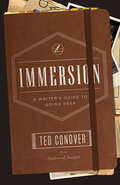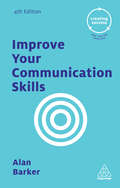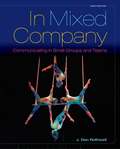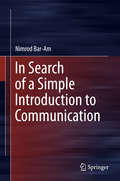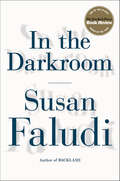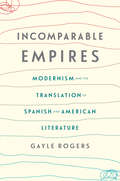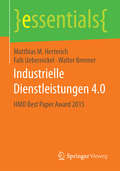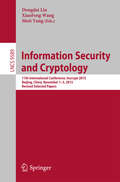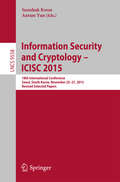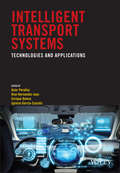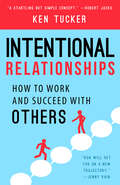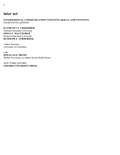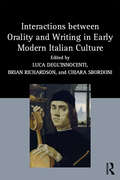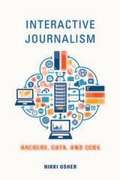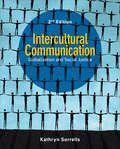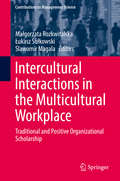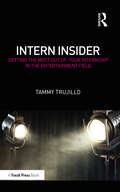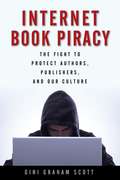- Table View
- List View
Immersion: A Writer's Guide to Going Deep (Chicago Guides to Writing, Editing, and Publishing)
by Ted ConoverOver three and a half decades, Ted Conover has ridden the rails with hoboes, crossed the border with Mexican immigrants, guarded prisoners in Sing Sing, and inspected meat for the USDA. His books and articles chronicling these experiences, including the award-winning Newjack: Guarding Sing Sing, have made him one of the premier practitioners of immersion reporting. In immersion reporting--a literary cousin to ethnography, travel writing, and memoir--the writer fully steps into a new world or culture, participating in its trials, rites, and rituals as a member of the group. The end results of these firsthand experiences are familiar to us from bestsellers such as Nickel and Dimed and Behind the Beautiful Forevers. But in a world of wary strangers, where does one begin? Conover distills decades of knowledge into an accessible resource aimed at writers of all levels. He covers how to "get into" a community, how to conduct oneself once inside, and how to shape and structure the stories that emerge. Conover is also forthright about the ethics and consequences of immersion reporting, preparing writers for the surprises that often surface when their piece becomes public. Throughout, Conover shares anecdotes from his own experiences as well as from other well-known writers in this genre, including Alex Kotlowitz, Anne Fadiman, and Sebastian Junger. It's a deep-in-the-trenches book that all aspiring immersion writers should have in hand as they take that first leap into another world.
Improve Your Communication Skills
by Alan BarkerImprove Your Communication Skills is your practical guide to effective verbal, non-verbal and written communication in business. Full of proven tips and techniques, it will help you keep the interest of a large audience, impress a potential employer or simply win the argument at an important meeting. Better communication skills can have a direct impact on your career development. This book provides vital guidance on improving your conversations, building rapport with colleagues, learning skills of persuasion, giving effective presentations, writing effective emails, letters and reports, and networking successfully. Now in its 4th edition, essential new content includes communicating across borders and virtual teams, influencing others subtly and managing difficult conversations, as well as helpful checklists and exercises. With the help of Improve Your Communication Skills, you will be able to achieve verbal, vocal and visual success - getting your message across every time.The creating success series of books...With over one million copies sold, the hugely popular Creating Success series covers a wide variety of topics and is written by an expert team of internationally best-selling authors and business experts. This indispensable business skills collection is packed with new features, practical content and inspiring guidance for readers across all stages of their careers.
In Defense of Pluralism: Policy Disagreement and its Media Coverage (Cambridge Studies in Comparative Public Policy)
by Éric MontpetitThe work of early pluralist thinkers, from Arthur Bentley to Robert Dahl, inspired much optimism about democracy. They argued that democracy was functioning well, despite disagreements arising among the diversity of interests represented in policy-making processes. Yet it is unlikely that anyone paying attention to news coverage today would share such optimism. The media portray current policy-making processes as intractably polarized, devoid of any opportunity to move forward and adopt essential policy changes. This book aims to revive our long-lost sense of optimism about policy-making and democracy. Through original research into biotechnology policy-making in North America and Europe, Éric Montpetit shows that the depiction of policy-making offered by early pluralist thinkers is not so far off the present reality. Today's policy decision-making process - complete with disagreement among the participants - is consistent with what might be expected in a pluralist society, in sharp contrast with the negative image projected by the media. Offers an original perspective on policy-making that takes a clear normative stand. Reveals the importance of journalism and the media in influencing policy-making and public perceptions. Provides sophisticated yet accessible quantitative analyses of policy-making.
In Mixed Company: Communicating In Small Groups and Teams
by J. Dan RothwellFeaturing a student-friendly narrative approach, market-leading IN MIXED COMPANY: COMMUNICATING IN SMALL GROUPS, 9th Edition combines solid theory, real-world examples, interactive applications, and the latest research on small group communication. Following the central unifying theme of cooperation, the text uses the communication competence model to guide discussions of key small group concepts and processes. It includes systems theory as a key theoretical component and continues its unique emphasis on the role of power in small group communication. <p><p> Thoroughly revised and updated, the Ninth Edition integrates business-oriented and workplace examples, surveys, and studies throughout. Doubling the coverage of group roles, the text includes expanded discussions of the types of informal group roles as well as comprehensive explanations of task, maintenance, and disruptive roles. Discussion of technology and its influence on small group communication also has been expanded. In addition, new interactive activities and exercises help students put what they learn into practice.
In Search of a Simple Introduction to Communication
by Nimrod Bar-AmThis book is a philosophical introduction to the field of communication and media studies. In search of the philosophical backgrounds of that relatively young field, the book explores why this overwhelmingly popular discipline is in crisis. The book discusses classic introductions on communication, provides an update on lessons learned, and re-evaluates the work of pioneers in the light of up-to-date philosophical standards. It summarizes various debates surrounding the foundations of system theory and especially its applicability to the Social Sciences in general and to Communication Studies in particular. Communication schools promise their students an understanding of the source of a principal and dynamical power in their lives, a power shaping societies and identities, molding aspirations, and deciding their fates. They also promise students a practical benefit, a chance to learn the secret of controlling that dynamical power, improving a set of skills that would ensure them a critical edge in the future job market: become better media experts for all media. Yet no one seems to know how such promises are met. Can there be a general theory of communication? If not, what can (should) communication students learn? This book looks at the problem from a philosophical perspective and proposes a framework wherein critical cases can be tested.
In the Darkroom
by Susan FaludiA Pulitzer Prize winner’s memoir of her search for her enigmatic father is “an absolute stunner . . . probing, steel-nerved, moving in ways you’d never expect” (New York Times).“In the summer of 2004 I set out to investigate someone I scarcely knew, my father. The project began with a grievance, the grievance of a daughter whose parent had absconded from her life. I was in pursuit of a scofflaw, an artful dodger who had skipped out on so many things—obligation, affection, culpability, contrition. I was preparing an indictment, amassing discovery for a trial. But somewhere along the line, the prosecutor became a witness.”So begins Susan Faludi’s extraordinary inquiry. When the feminist writer learned that her 76-year-old father—long estranged and living in Hungary—had undergone sex reassignment surgery, her investigation turned personal and urgent. How was this new parent who identified as “a complete woman now” connected to the silent, explosive, and ultimately violent father she had known?Faludi chases that mystery into the recesses of her suburban childhood and her father’s many previous incarnations: American dad, Alpine mountaineer, swashbuckling adventurer in the Amazon outback, Jewish fugitive in Holocaust Budapest. Her struggle to come to grips with her father’s metamorphosis takes her across borders—historical, political, religious, sexual—to bring her face to face with the question of the age: Is identity something you “choose,” or is it the very thing you can’t escape?“Riveting . . . Ms. Faludi unfolds her father’s story like the plot of a detective novel.” —Wall Street Journal“Penetrating and lucid . . . rich [and] arresting.” —New York Times Book Review“A gripping exploration of sexual, national, and ethnic identity.” —Kirkus Reviews, starred review
Incomparable Empires: Modernism and the Translation of Spanish and American Literature (Modernist Latitudes)
by Gayle RogersThe Spanish-American War of 1898 seems to mark a turning point in both geopolitical and literary histories. The victorious American empire ascended and began its cultural domination of the globe in the twentieth century, while the once-mighty Spanish empire declined and became a minor state in the world republic of letters. But what if this narrative relies on several faulty assumptions, and what if key modernist figures in both America and Spain radically rewrote these histories at a foundational moment of modern literary studies?Following networks of American and Spanish writers, translators, and movements, Gayle Rogers uncovers the arguments that forged the politics and aesthetics of modernism. He revisits the role of empire—from its institutions to its cognitive effects—in shaping a nation's literature and culture. Ranging from universities to comparative practices, from Ezra Pound's failed ambitions as a Hispanist to Juan Ramón Jiménez's multilingual maps of modernismo, Rogers illuminates modernists' profound engagements with the formative dynamics of exceptionalist American and Spanish literary studies. He reads the provocative, often counterintuitive arguments of John Dos Passos, who held that "American literature" could only flourish if the expanding U.S. empire collapsed like Spain's did. And he also details both a controversial theorization of a Harlem–Havana–Madrid nexus for black modernist writing and Ernest Hemingway's unorthodox development of a version of cubist Spanglish in For Whom the Bell Tolls. Bringing together revisionary literary historiography and rich textual analyses, Rogers offers a striking account of why foreign literatures mattered so much to two dramatically changing countries at a pivotal moment in history.
Independent Politics
by Samara Klar Yanna KrupnikovThe number of independent voters in America increases each year, yet they remain misunderstood by both media and academics. Media describe independents as pivotal for electoral outcomes. Political scientists conclude that independents are merely 'undercover partisans': people who secretly hold partisan beliefs and are thus politically inconsequential. Both the pundits and the political scientists are wrong, argue the authors. They show that many Americans are becoming embarrassed of their political party. They deny to pollsters, party activists, friends, and even themselves, their true partisanship, instead choosing to go 'undercover' as independents. Independent Politics demonstrates that people intentionally mask their partisan preferences in social situations. Most importantly, breaking with decades of previous research, it argues that independents are highly politically consequential. The same motivations that lead people to identify as independent also diminish their willingness to engage in the types of political action that sustain the grassroots movements of American politics.
India and the Islamic Heartlands
by Sood Gagan D. S."Based on the chance survival of a remarkable cache of documents, India and the Islamic Heartlands recaptures a vanished and forgotten world from the eighteenth century spanning much of today's Middle East and South Asia. Gagan Sood focuses on ordinary people--traders, pilgrims, bankers, clerics, brokers, scribes, among others--who were engaged in activities marked by large distances and long silences. By elucidating their everyday lives in a range of settings, from the family household to the polity at large, Sood pieces together the connective tissue of a world that lay beyond the sovereign purview. Recapturing this obscured and neglected world helps us better understand the region during a pivotal moment in its history, and offers new answers to old questions concerning early modern Eurasia and its transition to colonialism"--
Industrielle Dienstleistungen 4.0: HMD Best Paper Award 2015 (essentials)
by Matthias M. Herterich Falk Uebernickel Walter BrennerAuf Basis empirischer Daten von 45 konkreten Anwendungsfällen identifiziert dieses essential Nutzenpotentiale cyber-physischer Systeme im Kontext industrieller Dienstleistungen. Die Autoren nennen Implikationen und Handlungsempfehlungen für die Unternehmenspraxis. Die Leser erfahren, wie die fortschreitende Digitalisierung und der geschickte Einsatz cyber-physischer Systeme das Dienstleistungsgeschäft der produzierenden Industrie sowie im Maschinen- und Anlagenbau transformieren. Damit ergeben sich einerseits neue Möglichkeiten zur Effizienzsteigerung bereits bestehender Prozesse. Andererseits eröffnen sich bisher ungeahnte Möglichkeiten zur Umsetzung innovativer, datengetriebener industrieller Dienstleistungen.
Information Politics, Protests, and Human Rights in the Digital Age
by Mahmood MonshipouriWe live in a highly complex and evolving world that requires a fuller and deeper understanding of how modern technological tools, ideas, practices, and institutions interact, and how different societies adjust themselves to emerging realities of the digital age. This book conveys such issues with a fresh perspective and in a systematic and coherent way. While many studies have explained in depth the change in the aftermath of the unrests and uprisings throughout the world, they rarely mentioned the need for constructing new human rights norms and standards. This edited collection provides a balanced conceptual framework to demonstrate not only the power of autonomous communication networks but also their limits and the increasing setbacks they encounter in different contexts.
Information Security and Cryptology
by Moti Yung Dongdai Lin Xiaofeng WangThis book constitutes the thoroughly refereed post-conference proceedings of the 11th International Conference on Information Security and Cryptology, Inscrypt 2015, held in Beijing, China in November 2015. The 27 revised full papers presented were carefully reviewed and selected from 79 submissions. The papers are organized in topical sections on hash function; signature schemes; symmetric ciphers; elliptic curve and cryptographic fundamentals; Web and applications security; cloud security; key management and public key encryption; zero knowledge and secure computations; software and mobile security.
Information Security and Cryptology - ICISC 2015
by Soonhak Kwon Aaram YunThis book constitutes the thoroughly refereedpost-conference proceedings of the 18th International Conference on InformationSecurity and Cryptology, ICISC 2015, held in Seoul, South Korea, in November2015. The 23 revised full papers presented were carefullyselected from 84 submissions during two rounds of reviewing and improvement. The papers provide the latest results in research, development and applicationsin the field of information security and cryptology. They are grouped aroundthe following topics: digital signatures; public-key cryptography; block ciphercryptanalysis; elliptic curve cryptography; protocols; security; side-channelattacks.
Instagram als Marketing-Kanal: Die Positionierung ausgewählter Social-Media-Plattformen (essentials)
by Christoph Moss Manuel FaßmannManuel Fa#65533;mann und Christoph Moss f#65533;hren eine empirische Untersuchung der Charakterisierungen von Instagram, Facebook und Twitter aus der Sicht von Nutzern und Unternehmen durch. Das essential enth#65533;lt einen ausf#65533;hrlichen Vergleich der Kerneigenschaften dieser Plattformen. Die ausgew#65533;hlten Social-Media-Kan#65533;le werden anhand der analysierten Eigenschaften der Plattformen im Kommunikationsmix des Social-Media-Marketing (SMM) positioniert. Auf diese Weise vermittelt das essential die elementaren Grundlagen f#65533;r eine effektive und ad#65533;quate SMM-Strategieformulierung. Der Inhalt Moderne Markenf#65533;hrung Instagram als Marketing-Kanal: Strukturen, Funktionsweise und Relevanz Charakterisierung und Positionierung der Social-Media-Plattformen Instagram, Facebook und Twitter Die Zielgruppen Studierende und Dozierende der Sozial- und Kommunikationswissenschaften sowie der Betriebswirtschaftslehre Fach- und F#65533;hrungskr#65533;fte im Bereich Marketing und Kommunikation sowie Unternehmer und Selbstst#65533;ndige Die Autoren Manuel Fa#65533;mann, B. A. , absolviert ein PR-Volontariat und studiert Public Relations sowie Corporate Communication (M. A. ) an der Business and Information Technology School (BiTS) in Iserlohn. Prof. Dr. Christoph Moss leitet das Mediainstitut f#65533;r Marketing und Kommunikationsforschung an der BiTS-Hochschule in Iserlohn und unterrichtet dort Journalismus und Unternehmenskommunikation. Dar#65533;ber hinaus ber#65533;t er Unternehmen zu allen Fragen der Kommunikation.
Intelligent Transport Systems
by Enrique Onieva Unai Hernandez-Jayo Asier Perallos Ignacio Julio García ZuazolaThe book provides a systematic overview of Intelligent Transportation Systems (ITS). First, it includes an insight into the reference architectures developed within the main EU research projects. Then, it delves into each of the layers of such architectures, from physical to application layer, describing the technological issues which are being currently faced by some of the most important ITS research groups. The book concludes with some end user services and applications deployed by industrial partners. This book is a well-balanced combination of academic contributions and industrial applications in the field of Intelligent Transportation Systems. The most representative technologies and research results achieved by some of the most relevant research groups working on ITS, collated to show the chances of generating industrial solutions to be deployed in real transportation environments.
Intentional Relationships: How to Work and Succeed with Others
by Ken TuckerEvery day, our actions are structured by our relationships. Whether it be through family ties, a shared workspace, a favorite hobby, or some other repeated interaction, we are constantly building relationships. But do we ever stop to consider why we are in a relationship with a particular person? How can we make important relationships stronger? And how can we avoid unhealthy relationships? From Fortune 500 consultant Ken Tucker, Intentional Relationships answers these questions and more in a surprising, life-changing, and career-enhancing way. Recognize and celebrate the most valuable connections in your life by practicing Intentional Relationships.
Inter-act: Interpersonal Communication: Concepts, Skills, and Contexts
by Kathleen S. Verderber Erina L. MacGeorgeDesigned to help students explore interactions in both personal and professional domains, and develop the specific skills necessary to creating and maintaining healthy relationships, Inter-Act: Interpersonal Communication Concepts, Skills, and Contexts, Fourteenth Edition, retains the features that have made this book so successful: a theory driven and skills-based focus, an accessible tone and presentation, and a multitude of useful pedagogical tools. For this edition, new coauthor Erina MacGeorge has brought her in-depth knowledge of current theory to bear on each chapter, thoroughly updating the material so that it reflects the current state of knowledge in the discipline.
Interactions between Orality and Writing in Early Modern Italian Culture
by Brian Richardson Luca Degl’Innocenti Chiara SbordoniInvestigating the interrelationships between orality and writing in elite and popular textual culture in early modern Italy, this volume shows how the spoken or sung word on the one hand, and manuscript or print on the other hand, could have interdependent or complementary roles to play in the creation and circulation of texts. The first part of the book centres on performances, ranging from realizations of written texts to improvisations or semi-improvisations that might draw on written sources and might later be committed to paper. Case studies examine the poems sung in the piazza that narrated contemporary warfare, commedia dell'arte scenarios, and the performative representation of the diverse spoken languages of Italy. <P><P> The second group of essays studies the influence of speech on the written word and reveals that, as fourteenth-century Tuscan became accepted as a literary standard, contemporary non-standard spoken languages were seen to possess an immediacy that made them an effective resource within certain kinds of written communication. The third part considers the roles of orality in the worlds of the learned and of learning. The book as a whole demonstrates that the borderline between orality and writing was highly permeable and that the culture of the period, with its continued reliance on orality alongside writing, was often hybrid in nature.
Interactive Journalism: Hackers, Data, and Code
by Nikki UsherInteractive journalism has transformed the newsroom. Emerging out of changes in technology, culture, and economics, this new specialty uses a visual presentation of storytelling that allows users to interact with the reporting of information. Today it stands at a nexus: part of the traditional newsroom, yet still novel enough to contribute innovative practices and thinking to the industry. Nikki Usher brings together a comprehensive portrait of nothing less than a new journalistic identity. Usher provides a comprehensive history of the impact of digital technology on reporting, photojournalism, graphics, and other disciplines that define interactive journalism. Her eyewitness study of the field's evolution and accomplishments ranges from the interactive creation of Al Jazeera English to the celebrated data desk at the Guardian to the New York Times' Pulitzer-endowed efforts in the new field. What emerges is an illuminating, richly reported portrait of the people coding a revolution that may reverse the decline and fall of traditional journalism.
Intercultural Communication: Globalization and Social Justice
by Kathryn SorrellsIntercultural Communication: Globalization and Social Justice, Second Edition, introduces students to the study of communication among cultures within the broader context of globalization. Kathryn Sorrells highlights history, power, and global institutions as central to understanding the relationships and contexts that shape intercultural communication. Based on a framework that promotes critical thinking, reflection, and action, this text takes a social justice approach that provides students with the skills and knowledge to create a more equitable world through communication. Loaded with new case studies and contemporary topics, the Second Edition has been fully revised and updated to reflect the current global context, emerging local and global issues, and more diverse experiences.
Intercultural Communication: Globalization and Social Justice
by Kathryn SorrellsIntercultural Communication: Globalization and Social Justice, Second Edition, introduces students to the study of communication among cultures within the broader context of globalization. Kathryn Sorrells highlights history, power, and global institutions as central to understanding the relationships and contexts that shape intercultural communication. Based on a framework that promotes critical thinking, reflection, and action, this text takes a social justice approach that provides students with the skills and knowledge to create a more equitable world through communication. Loaded with new case studies and contemporary topics, the Second Edition has been fully revised and updated to reflect the current global context, emerging local and global issues, and more diverse experiences.
Intercultural Interactions in the Multicultural Workplace
by Małgorzata Rozkwitalska Łukasz Sułkowski Slawomir MagalaThis volume explores the work environment in multinational corporations. To do so, it integrates studies on the organizational sciences, cross-cultural management, positive psychology and sociology within a single comprehensive framework. Twenty-two authors from six countries identify the challenges in multicultural workplaces, the positives of interactions, cultural clashes and their organizational preconditions. They add inter-organizational, institutional and critical perspectives to the analysis within the framework of multinationals and complex, hybrid cultural environments. The book addresses the needs of researchers in the areas of intercultural management, and those of practitioners in international human resource management.
Intern Insider: Getting the Most Out of Your Internship in the Entertainment Field
by Tammy TrujilloInternships have all but became a requirement when starting out in the fields of entertainment and broadcasting. Students need these internships not only to get their foot in the door, but to gain valuable experience that gives them an advantage when going for that first job in the industry. Intern Insider helps students navigate the often daunting task of finding an internship, and equips readers to use the experience learned to begin a strong career in the entertainment world. As both a professional broadcaster and college professor, author Tammy Trujillo approaches the topic of internships from both sides: what the student and intern site hope to gain. She provides various valuable perspectives throughout the book, including student assessments on their internship experiences, case studies of those who have turned their internships into careers, and interviews with internship site coordinators. Her breadth of knowledge and experience make for a ground-level book both informative and useful. In the competitive landscape of today’s entertainment and broadcasting worlds, Intern Insider provides students with all the tools they need to make the most of their internships and jumpstart their careers!Also visit http://www.interninsider-thebook.com/
International Negotiation
by Ho-Won JeongNegotiation has always been an important alternative to the use of force in managing international disputes. This textbook provides students with the insight and knowledge needed to evaluate how negotiation can produce effective conflict settlement, political change and international policy making. Students are guided through the processes by which actors make decisions, communicate, develop bargaining strategies and explore compatibilities between different positions, while attempting to maximize their own interests. In examining the basic ingredients of negotiation, the book draws together major strands of negotiation theories and illustrates their relevance to particular negotiation contexts. Examples of well-known international conflicts and illustrations of everyday situations lead students to understand how theory is utilized to resolve real-world problems, and how negotiation is applied to diverse world events. The textbook is accompanied by a rich suite of online resources, including lecture notes, case studies, discussion questions and suggestions for further reading.
Internet Book Piracy: The Fight to Protect Authors, Publishers, and Our Culture
by Gini Graham ScottThe international battle against Internet pirates has been heating up. Increasingly law enforcement is paying attention to book piracy as ebook publishing gains an ever-larger market share. With this threat to their health and even survival, publishers and authors must act much like the music, film, and software giants that have waged war against pirates for the past two decades. Now, The Battle against Internet Piracy opens a discussion on what happens to the victims of piracy. Drawing from a large number of interviews-from writers, self-publishers, mainstream publishers, researchers, students, admitted pirates, free speech advocates, attorneys, and local and international law enforcement officials-the text speaks to such issues as: Why pirates have acted and how they feel about it The conflict over constitutional rights and piracy The current laws surrounding Internet piracy Examples of cases taken against some pirates Alternatives to piracy Personal experiences of being ripped off The ways piracy affects different industries and how they’ve respondedAuthor Gini Graham Scott prepares readers to arm themselves against these modern perils by learning about copyright, infringement, and how to prevent, combat, and end book piracy.Allworth Press, an imprint of Skyhorse Publishing, publishes a broad range of books on the visual and performing arts, with emphasis on the business of art. Our titles cover subjects such as graphic design, theater, branding, fine art, photography, interior design, writing, acting, film, how to start careers, business and legal forms, business practices, and more. While we don't aspire to publish a New York Times bestseller or a national bestseller, we are deeply committed to quality books that help creative professionals succeed and thrive. We often publish in areas overlooked by other publishers and welcome the author whose expertise can help our audience of readers.
